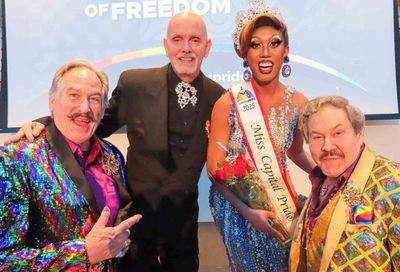Lost in Translation
'Pillowman' contains flashes of the brilliance inherent in the play, but Studio's take suffers in an American context

How’s this for irony? In The Pillowman, Irish playwright Martin McDonagh creates a fascinating, multi-layered drama/fantasy that brilliantly navigates all manner of socially dangerous topics. Yet in the current production by the Studio Theatre, the audience’s suspension of disbelief stumbles on one tiny ant-hill: This play ain’t American and no one seems to have noticed.
The Pillowman is utterly Irish-English. It is not something that can be plucked out of its context and produced in the theatrical ether. Nearly everything that flavors McDonagh’s writing suggests a history, a society, and a way of communicating that has evolved in a parallel, but different, universe from America. In another play, it might not have mattered, but in this one it does. Pillowman begs to speak with a certain timing and crackle that exist only in the Orwellian confines of a British interrogation room. Under the American accents, the American personas — under the very emphases in the American completion of a sentence — the personality of the play withers. Without its essence intact, moments are man-handled and moods are lost. When you find yourself fantasizing about reading the play instead of watching it, you know something is amiss.
 Language barrier: Arndt, Story and Nees (Photo by Carol Pratt) |
Of course, Americans can do Shakespeare even without the authentic accents, but someone has to do the work of connecting the actors to the emotional world of their characters. Unfortunately, although the actors here seem to have grappled hard with how to deliver McDonagh’s idiosyncratic material, without a director who can find a way into the rhythm of the play, the production must remain troubled.
Still, no one can blame Studio for wanting to take a stab at Pillowman. After all, how many plays can develop a sharp-witted thriller, a storyteller’s fantasy, and various metaphors regarding the balance between a writer’s responsibility to society and his need to create, all in one event? How many playwrights have the sublime ability to present the abuse or murder of children in such a way that the gravity never quite overtakes the allegory? The layers and concepts are breathtaking.
But at some point the rubber must hit the road. Tom Story is Katurian, the seemingly mild-mannered writer who finds himself in the clutches of two police officers of a totalitarian state. As the plot unfolds, the police question Katurian, and then his mentally challenged brother Michel, about the apparent murders of three children, focusing on a series of stories Katurian has written. During the course of these interrogations and their interludes, more and more of Katurian is revealed along with an examination of his culpabilities, both real and imagined.
Story interprets Katurian as something akin to a technical writer in tweed temping in the bowels of K Street, but he is hard to place in an American context. When he plays it straight, he veers towards a Greg Kinnear-style pathos and when he gets sarcastic he heads off into David Hyde Pierce country. Neither work with the language of the play. Story is obviously an actor with subtlety and range, but he grafts American onto foreign and it is more like shadowing than inhabiting the character. Still, he gives a very consistent and heartfelt performance.
Although Story has the most work to do, the standout in terms of presence and concept has to be Denis Arndt as Detective Tupolski. Arndt recognizes the challenge of mounting this production in the United States, probably knows exactly how the British would do it, and comes closest to embodying a kind of transatlantic archetype that actually works. For one thing, he has a superb, slightly old-fashioned diction that comes of a real American voice and yet just about allows for the British dialogue. He delivers his one-liners with irony slathered in relish and his stage presence gives his character the necessary gravitas. Together, he and Story make a reasonable core in the push of pull of the unfolding drama. But what progress they make is unfortunately diluted by Hugh Nees as Ariel, the police officer playing bad cop to Tupolski’s good, and Aaron Munoz as Michal, Katurian’s troubled brother.
The Pillowman   To April 22 Studio Theatre 1501 14th St. NW 202-332-3300 www.studiotheatre.org |
Nees certainly looks the part of a cop used to brutalizing his suspects. But he never quite relaxes into character and, again, he doesn’t quite get the delivery of certain turns of phrase. Munoz does not have an easy role; he must play the fool and yet his character at times seems to almost morph into a figment of Katurian’s imagination or a voice of conscience. But Munoz doesn’t give us much to hold onto; there is too much voice, too much stagy physicality. When he flops around being a child in a man’s body, it is like one of those tasteless Saturday Night Live skits that go on too long. It is impossible to imagine how these two brothers connect — either in reality or in metaphor.
Although the production moves apace and uses its sets wisely, the bottom line is that it’s a missed opportunity.
Support Metro Weekly’s Journalism
These are challenging times for news organizations. And yet it’s crucial we stay active and provide vital resources and information to both our local readers and the world. So won’t you please take a moment and consider supporting Metro Weekly with a membership? For as little as $5 a month, you can help ensure Metro Weekly magazine and MetroWeekly.com remain free, viable resources as we provide the best, most diverse, culturally-resonant LGBTQ coverage in both the D.C. region and around the world. Memberships come with exclusive perks and discounts, your own personal digital delivery of each week’s magazine (and an archive), access to our Member's Lounge when it launches this fall, and exclusive members-only items like Metro Weekly Membership Mugs and Tote Bags! Check out all our membership levels here and please join us today!



















